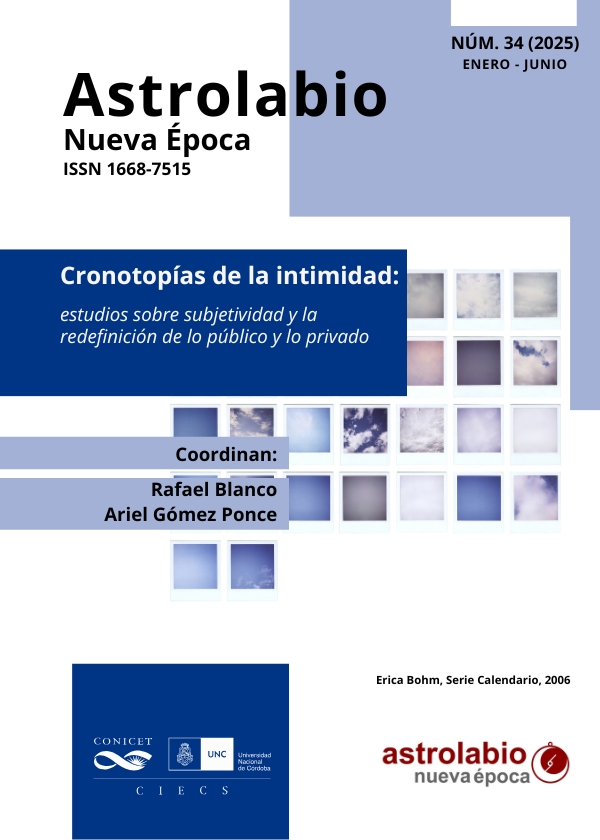Human Rights, Mothers of Plaza de Mayo and Mercedes Sosa: Historical Refractions in Biographical Documentaries
Main Article Content
Abstract
The objective of our reflection is to understand how two biographical documentaries about Mercedes Sosa refract the struggle of the Mothers of Plaza de Mayo, detecting which were the discursive strategies carried out by each documentary maker and what effects are produced by this approximation that can be defined as having a “biographical value” (Bajtín, 1982). Methodologically, discourse analysis is used to observe the thematic construction throughout the two documentaries in light of the analytical perspectives derived from the study of texts (Bajtín, 1982). The conclusions will account for the existence of two different images of Mercedes Sosa in relation to the struggle for human rights in Argentina. These images come from the application of biographical values that differ from each other, confirming that, in one of the documentaries, the narrative construction presents Mercedes Sosa's struggle in the present, while the other story proposes a projection of the future, in a world after the dictatorship.
Article Details

This work is licensed under a Creative Commons Attribution-NonCommercial-ShareAlike 4.0 International License.
Astrolabio, Nueva Época está protegida bajo licencia Licencia Creative Commons Atribución-NoComercial-CompartirIgual 4.0 Internacional. La propiedad intelectual de los artículos pertenece a los autores y los derechos de edición y publicación a la revista. Los artículos publicados podrán ser usados libremente para propósitos científicos y académicos, siempre y cuando se realice una correcta citación de los mismos. Cualquier persona física o jurídica que desee reimprimir parte o la totalidad de algún artículo, deberá obtener permiso escrito de los editores de Astrolabio Nueva Época, quien lo otorgará con el consentimiento del autor.
How to Cite
References
ARFUCH, Leonor (2010). O Espaço Biográfico: dilemas da subjetividade contemporânea. Rio de Janeiro: EdUERJ.
BAJTÍN, Mijaíl. (1982). Estética de la creación verbal. México: Siglo XXI.
BAJTÍN, Mijaíl M. (1997). Hacia una filosofía del acto ético. De los borradores y otros escritos. Barcelona: Anthropos.
BAJTÍN, Mijaíl M. (MEDVEDEV, Pavel N.). (1994). El método formal en los estudios literarios. Introducción crítica a una poética sociológica. Madrid: Alianza.
BARTHES, Roland. (1984). La mort de l’auteur. En Le bruissement de la langue, pp. 61-69. Paris: Seuil.
CALVEIRO, Pilar. (2013). Poder e desaparecimento: os campos de concentração na Argentina. São Paulo: Boitempo.
CARVAJAL, Fernanda y NOGUEIRA, Fernanda. (2014). Enunciar la ausencia. En AA. VV., Perder la forma humana: una imagen sísmica de los años ochenta en América Latina, p.103-110. Madrid: Museo Nacional Centro de Arte Reina Sofía.
DOSSE, François. (2009). O Desafio Biográfico: escrever uma vida. São Paulo: EDUSP.
NOVARO, Marcos y PALERMO, Vicente. (2007). A ditadura militar argentina 1976-1983. Do golpe de estado à restauração democrática. São Paulo: EDUSP.
SARLO, Beatriz. (2005). Tiempo pasado. Cultura de la memoria y giro subjetivo. Una discusión. Buenos Aires: Siglo XXI.
SARLO, Beatriz. (2016). Paisagens imaginárias: intelectuais, arte e meios de comunicação. São Paulo: EDUSP.
SARLO, Beatriz. (2021). “Relato, historia y memoria”. Revista de Teoria da História, 24-2, 17-32.
SOUZA, Nathan Bastos. (2021). Uma voz para a América Latina? A elaboração discursiva da vida de Mercedes Sosa em documentários biográficos. Tesis de Doctorado en Lingüística, Universidade Federal de São Carlos, Brasil.
SOUZA, Nathan Bastos. (2023). “Discurso biográfico: uma proposta de exame do funcionamento discursivo”. Diálogo das Letras, 12, 1-18. Disponible en: https://periodicos.apps.uern.br/index.php/DDL/article/view/4962/3778 [consulta: abril de 2024].

